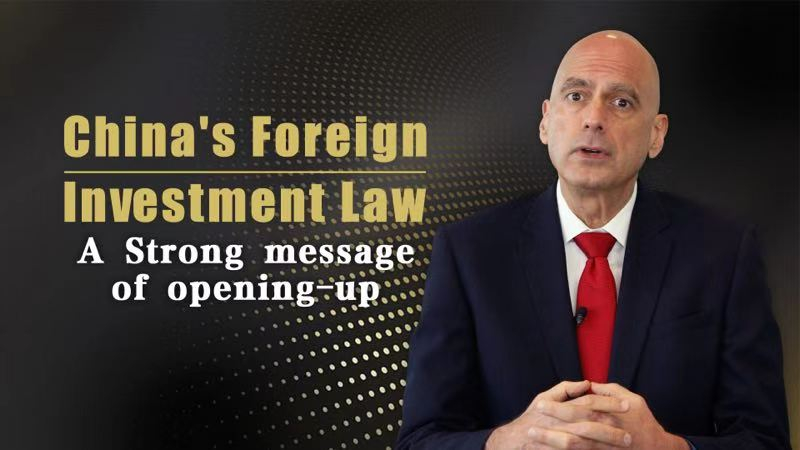
Opinion
18:27, 08-Mar-2019
China's Foreign Investment Law: A strong message of opening-up
Edward Lehman
04:00

Editor's note: Edward Lehman is a senior foreign fellow of the Chinese Academy of Social Sciences. The article reflects the author's views, and not necessarily those of CGTN.
CGTN: It's been widely believed that the draft Foreign Investment Law will highly possibly be passed after discussion during the National People's Congress. How would the law affect foreign investment in China?
Lehman: What I think we're gonna see is that there will be an increase in foreign direct investment in China as a result of this law. It's also going to allow national treatment for a lot of different industries and it will increase the foreign direct investment by decreasing the negative list.
This is going to be part of the economic stimulus for the country, which will be much needed and much appreciated for China, and the rest of the world.
CGTN: Western media's so-called criticism of China's forced technology transfer has hovered around for months. How will this law address the issue effectively?
Lehman: The new Foreign Investment Law actually addresses that these ideas that forced technology transfer is not to be permitted. And when you're talking about intellectual property, the devil or god is always in the details.
I think that a lot of times in media today is an intellectual property practitioner. I see this, on a daily basis, that one can say forced technology transfer is a problem. Yes, it is a problem, but give me the details.
In every time that I deal with clients both Chinese and foreign, we have to understand the exact circumstances in the facts of the case. The laws, policies and regulations on intellectual property are among the best in the world. There's no question about it.
The issue with the actual implementation of these laws, policies and regulations through the court system is really a gargantuan undertaking with regards to the infrastructure.
I mean the infrastructure here is not as well developed as it is in the United States or in other countries. And so I think we have to keep those kinds of things in mind with regards to being patient about just the infrastructure, about how to implement these things and how to go forward.
I think the intent is there and that should be well known to the public.
CGTN: Some are skeptical about this law and think some of its content is ambiguous. What is your take on this?
Lehman: There's always problems with the justice systems, with the legal system. The legal system is an attempt to try to move in the right direction.
Are there gonna be loopholes, (and) are there gonna be problems? Yes, there are with this system in China and with the system anywhere in the world that's trying to honestly go forward. Should that be viewed as a negative thing? The answer is no.
I mean it's just the struggle of how do you run a country and how do you make an economic system work through laws, policies, and regulations. I think what should be lauded is the actual step forward in this direction. We'll see how that works and we will wait to see what happens.
CGTN: Some reports say that the law is not going to satisfy U.S. demands in the China-U.S. trade conflicts, and it is just a method to alleviate trade tensions between the two countries. What's your opinion?
Lehman: The first step in a journey of ten thousand li is a single step. I think that nothing is going to be able to satisfy anyone immediately.
I mean, this is a longer trade route and pathway and I think everyone knows and I think what has been demonstrated the deadline was to be March 1 in which they were gonna have these things sorted out. That has been now extended.
I think people are realistic that all good things take time and that this is going to be well thought out.
It's not just about short term gains; but it's about what happens when you make these decisions, the unintended consequences that happen once you make these decisions.
So it's one thing to placate the other side, but it's also another thing to understand what are the implications for both sides with regards to these changes. I think that the intent is good and that's what we should focus on.
Reporter: Li Yunlong
Creative planning: Li Yunlong
Videographers: Guo Yuanheng
Video editors: Wu Chutian
Producer: Wei Wei
Supervisor: Zhang Shilei
(If you want to contribute and have specific expertise, please contact us at opinions@cgtn.com.)

SITEMAP
Copyright © 2018 CGTN. Beijing ICP prepared NO.16065310-3
Copyright © 2018 CGTN. Beijing ICP prepared NO.16065310-3